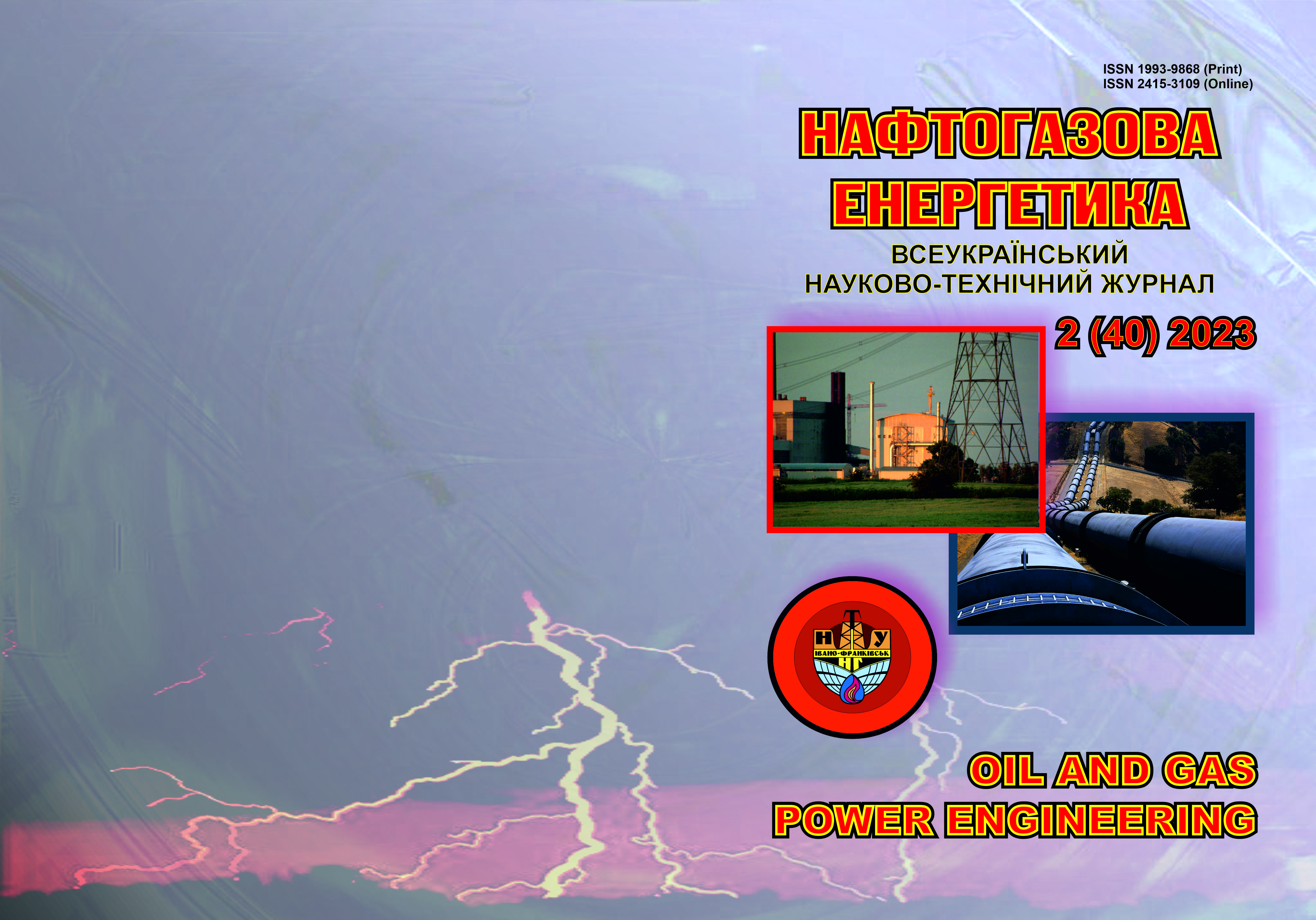Influence of hydrogen concentration on the properties of gas-hydrogen mixtures and gas-dynamic processes in gas distribution networks
DOI:
https://doi.org/10.31471/1993-9868-2023-2(40)-25-37Keywords:
low-pressure gas networks, real gas; gas-hydrogen mixture; standard conditions; density; volumetric heat of combustion; gas dynamic calculationAbstract
The purpose of the work is to clarify the regularities of the influence of the volume concentration of hydrogen on the physical and thermodynamic properties of the gas-hydrogen mixture, the gas-dynamic modes of operation of distribution gas networks and the volumes of their energy transfer to consumers. On the basis of modern methods of taking into account the real properties of gases, the influence of the volume concentration of hydrogen in the range (0-100) % on the density, gross and net calorific value, gross and net Wobbe index, viscosity of gas-hydrogen mixtures under the standard conditions established for distribution gas networks of Ukraine. Graphical dependen-cies were constructed, and their mathematical modeling was performed. The results of the refined calculation of the properties of gas-hydrogen mixtures were used to perform multivariate gas-dynamic calculations of the low-pressure gas pipeline over the full range of its loading. Refined results were obtained regarding the influence of vol-ume concentration of hydrogen on the gas-dynamic energy consumption of low-pressure gas networks at the costs that occurred for natural gas. The value of the coefficients of the increase in costs in the low-pressure gas pipeline to compensate for the decrease in the gross and net calorific value heat of combustion of the gas-hydrogen mixture has been specified. The degree of increase in the hydraulic energy consumption of the low-pressure gas pipeline for the transmission of energy supplied by natural gas was determined. All research results correspond to the standard temperature of 0 оС. In the practice of operation of distribution gas networks, there are cases of a change in the standard temperature from 0 оС to 20 оС. This made it necessary to carry out additional research on the properties of gas-hydrogen mixtures and the gas-dynamic energy consumption of a low-pressure gas pipeline at a standard temperature of 20 оС.
Downloads
References
Kevin Topolski, Evan P. Reznicek, Burcin Cakir Erdener, Chris W. San Marchi, Joseph A. Ronevich, Lisa Fring, Kevin Simmons, Omar Jose Guerra Fernandez, Bri-Mathias Hodge, and Mark Chung. Hydrogen Blending into Natural Gas Pipeline Infrastructure: Review of the State of Technology. URL: https://doi.org/10.2172/1893355.
Transporting Pure Hydrogen by Repurposing Existing Gas Infrastructure: Overview of existing studies and reflections on the conditions for repurposing. URL: https://acer.europa.eu/Official_documents/Acts_of_the_Agency/Publication/
Transporting Pure Hydrogen by Repurposing Existing
Gas Infrastructure Overview of studies.pdf
Yue Su, Jingfa Li, Wangyi Guo, Yanlin Zhao, Jianli Li, Jie Zhao and Yusheng Wang Prediction of Mixing Uniformity of Hydrogen Injection in Natural Gas Pipeline Based on a Deep Learning Model. URL: https://www.mdpi.com/1996-1073/15/22/8694.
Proekt dorozhnoi karty dlia vyrobnytstva ta vykorystannia vodniu v Ukrayini. URL: https://unece.org/sites/default/files/2021-03/Hydro gen Roadmap Draft Report_UKR March 2021.pdf [in Ukrainian]
Serediuk M. D. Hazodynamichni rezhymy ekspluatatsii hazovykh merezh nyzkoho tysku pry transportuvanni hazovodnevykh sumishei. Mizhnarodnyi naukovyi zhurnal «Internauka». 2021. No 1 (101). T. 1. P. 52–62. DOI: https://doi.org/10.25313/2520-2057-2021-1-6822. [in Ukrainian]
Serediuk M. D. Osoblyvosti hazodynamich-nykh protsesiv u hazovykh merezh serednoho i vysokoho tysku za transportuvannia hazo-vodnevykh sumishei. Mizhnarodnyi naukovyi zhurnal «Internauka». 2021. No 2 (102). P. 87–95. DOI: https://doi.org/10.25313/2520-2057-2021-2-6887. [in Ukrainian]
Serediuk M. D. Osoblyvosti hazodynamich-noho rozrakhunku vnutrishnikh hazovykh merezh pry zastosuvanni hazovodnevykh sumishei. Mizhnarodnyi naukovyi zhurnal «Internauka». 2021. No 11 (111). P. 73–80. DOI: 10.25313/2520-2057-2021-11-7484. [in Ukrainian]
DBN V.2.5-20-2018. Hazopostachannia. [in Ukrainian]
DSTU EN ISO 6976:2020 Pryrodnyi haz. Obchyslennia teploty zghoriannia, hustyny, vidnosnoi hustyny ta chysla Vobbe na osnovi komponentnoho skladu. [in Ukrainian]
Honcharuk M. I., Serediuk M. D, Sheludchenko V. I. Dovidnyk z hazopostachannia naselenykh punktiv Ukrainy. Ivano-Frankivsk: Simyk, 2006. 313 p. [in Ukrainian]
Serediuk M. D., Velykyi S. V. Analiz metodiv vyznachennia hazodynamichnoi enerho-vytratnosti hazovykh merezh naselenykh punktiv. Naftohazova enerhetyka. 2022. No 2(38). P.51–61. DOI: 10.31471/1993-9868-2022-2(38)-51-61. [in Ukrainian]
Serediuk M. D. Proiektuvannia ta eksplu-atatsiia hazovykh merezh: navch. posib. Ivano-Frankivsk: IFNTUNH, 2022. 144 p. ISBN 978-966-694-409-5. [in Ukrainian]
Downloads
Published
How to Cite
Issue
Section
License
Copyright (c) 2024 Oil and Gas Power Engineering

This work is licensed under a Creative Commons Attribution-ShareAlike 4.0 International License.


.png)






1.png)









